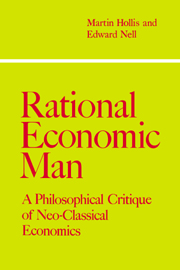Book contents
- Frontmatter
- Contents
- Preface
- Introduction
- 1 Relevance and falsification
- 2 Rational economic man
- 3 Theory and hypothesis
- 4 Facts and theories
- 5 Behaviour and prediction
- 6 A priori knowledge
- 7 Deductive explanation
- 8 The assumptions of neo-Classicism
- 9 Rationalist foundations for economic theory
- Bibliography
- Index
9 - Rationalist foundations for economic theory
Published online by Cambridge University Press: 12 October 2009
- Frontmatter
- Contents
- Preface
- Introduction
- 1 Relevance and falsification
- 2 Rational economic man
- 3 Theory and hypothesis
- 4 Facts and theories
- 5 Behaviour and prediction
- 6 A priori knowledge
- 7 Deductive explanation
- 8 The assumptions of neo-Classicism
- 9 Rationalist foundations for economic theory
- Bibliography
- Index
Summary
We have just seen how neo-Classical assumptions underwrite the neo-Classical picture of the price mechanism as a sensitive flexible instrument for allocating resources optimally while resolving questions of exchange and payment to the benefit of all parties and in the process preserving and even enhancing efficiency. We have argued not only that these assumptions are not fulfilled, but also that they cannot be, given the world we live in. Given modern technology and the role of durable goods in it, the assumption of easy, costless transfer of resources is nonsensical. However, when we try to make it look plausible, by admitting that there is at least some cost to transferring resources, the model is weakened, as the assumption of mobility comes into conflict with the assumption of rationality. Exactly the same happens to the assumption of market information; when we take account of the reality of communications and information technology and allow for the cost of information, the same conflict emerges. In addition and perhaps even more interestingly, some crucial information, strategic information about competitors' intentions, actually presupposes immobilities and inflexibilities. The neo-Classical world ignores power and power thrives on rigidity. Once we allow that there must be immobilities, information gaps, and imperfectly adjusted durable capital structures, we can expect a world where, for instance, bad products drive out good.
Two properties of bearers
Let us examine this further. The four objections can be met with epicycles, while we remain within the neo-Classical system. But they cannot be evaded, once we turn to considering the necessary conditions for reproduction. The objections then show, we maintain, that neo-Classicism is not so impossible but nonetheless impracticable; that, given our world,
- Type
- Chapter
- Information
- Rational Economic Man , pp. 233 - 266Publisher: Cambridge University PressPrint publication year: 1975



